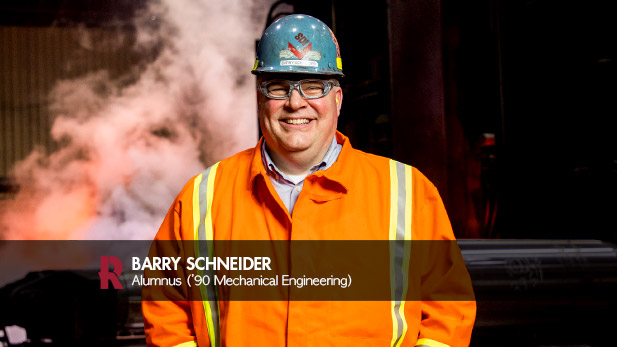Alum Barry Schneider Lines Up Steel Success

Mechanical engineering alum Barry Schneider has built a career with lessons learned on campus, matured through decades of experience, that are now being applied as president and chief operations officer in leading Steel Dynamics.
The parallels are unmistakable. On the football field, an offensive lineman's job is to create opportunities for others to succeed—allowing running backs and the quarterback to make the big plays that capture headlines. In the steel industry, 1990 mechanical engineering alum Barry Schneider has spent three decades doing the same thing: building the infrastructure, systems, and teams that have allowed Steel Dynamics to deliver the materials constructing America's buildings, bridges, and future.
"I'm good at working with others in building teams that accomplish our goals and objectives," said Schneider, a former Fightin’ Engineer football player who is experiencing career success with one of the nation's largest steel producers. "That comes from my time working with teammates as a football player. It was a winning combination at Rose-Hulman and has also served me well at Steel Dynamics."
Today, as Steel Dynamics’ president and chief operations officer since March 2023, Schneider oversees operations that are literally building America's future. His responsibilities span the company’s steel platform, steel fabrication platform, and metals recycling platform—essentially overseeing the entire operational ecosystem.
This is a position that recognizes Schneider’s unique combination of technical expertise, operational experience, and leadership capability. His career that’s been centered on steel showcases how an engineering education, tempered by athletic discipline and refined through continuous learning, has transformed both an individual and an entire industry.
When he arrived at Rose-Hulman from the Cleveland suburbs in the fall of 1986, Schneider embodied the Institute's practical approach to engineering education. While other students might have seen mechanical engineering and football as competing demands on their time, Schneider recognized them as complementary disciplines. Both required precision, preparation, and the ability to execute under pressure.
His degree gave him the technical foundation to understand the complex metallurgical processes that transform raw materials into finished steel products. But it was the daily grind of football practice—the repetition, the attention to detail, the understanding that individual performance means nothing without team success—that would prove equally valuable in steel mills across the Midwest.
When Schneider joined Steel Dynamics in 1995, just two years after its founding outside Fort Wayne, Indiana, he wasn't just accepting a job—he was buying into a vision. The company was attempting something audacious: competing with established steel giants by being faster, more efficient, and more innovative. For a young engineer barely five years out of college, it was the opportunity of a lifetime.
His first assignment perfectly captured the startup spirit: engineering, construction, and commissioning of Steel Dynamics' first greenfield steel plant melt shop in Butler, Indiana. This wasn't textbook engineering—it was building something from nothing, solving problems that didn't exist in any manual, creating systems that would help define the company's future.
The experience was transformative. While his Rose-Hulman education provided the theoretical framework, the Butler plant construction taught him how engineering theory translates into industrial reality. Every decision had consequences measured not just in efficiency percentages, but in millions of dollars and thousands of jobs.
Schneider's transition from operational manager to executive leader represents a masterclass in strategic career development—and demonstrates another Rose-Hulman characteristic: the understanding that learning never stops. Nearly two decades after earning his bachelor’s degree from the Institute, he returned to campus to earn a master’s degree in engineering management in 2011. The program expanded his knowledge of operations development, project management, marketing, and systems engineering.
"The engineering management program was ideal for accentuating the strong engineering skills that I had gained at Rose-Hulman as an undergraduate, while complementing the valuable work experiences I had gained on the production floor within steel processing plants,” Schneider notes about his decision to return for a master’s degree.
By 2010, he was already a veteran Steel Dynamics executive but understood something crucial in his career development: in a rapidly evolving industry, continuous learning isn't optional—it's survival.
What sets Schneider apart isn't just his technical competence—it's his understanding of how complex industrial operations actually function. Steel production isn't a series of independent processes; it's an intricate dance where timing, coordination, and anticipation determine success or failure.
“Everything we do at Steel Dynamics takes a team approach to meeting others' demanding expectations. While we continue to grow and expand our operations, we make sure that there’s a small company feel to our operations and our concentration about putting our people first. They are the reason for our success,” he remarks.
Supporting Schneider along every step in his personal and professional journey has been his wife, Verna. The couple started dating in the 10th grade, and she has held and pushed him through football seasons, injuries, steel plant startups, and multiple moves.
“I can't imagine being the person I am without her in my life,” he says.
That family attitude also extends to the team of Rose-Hulman alumni that’s helping Steel Dynamics meet today’s industry challenges. The group includes vice presidents Jeff Hansen (sustainability operations) and Dan Keown (manager of Columbus, Mississippi, plant), Copperworks President Kurt Breischaft, General Manager Dennis Black (Sinton, Texas, plant), Plant Electrical Maintenance Manager Sean Marlowe (Butler plant), and Day Melting Supervisor David Lunceford (Columbia City, Indiana, plant).
From the gridiron to the steel mill, Schneider has built his career on a simple principle: excellence in execution enables others to achieve greatness. It's a lesson learned at Rose-Hulman, refined through decades of experience, and now applied to leading one of America's most important industrial companies into its next chapter of growth and innovation.